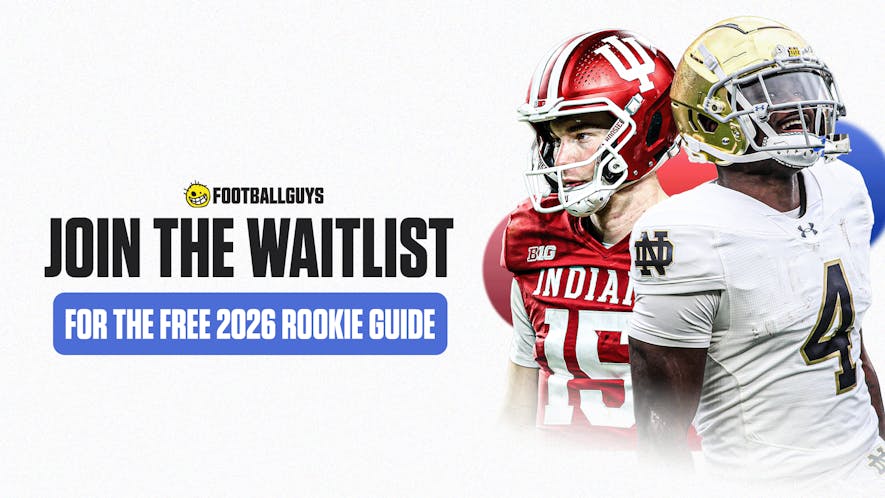Who is the most valuable quarterback in dynasty right now? For a while, it was Andrew Luck, but his injury seems to have thrown things into question a bit. For the most part, I suspect a plurality of owners would take Aaron Rodgers, with a second large group standing behind Andrew Luck based on his 5-year age advantage, and maybe a third rogue faction backing Russell Wilson, who is roughly as young as Luck but with a clean bill of health.
A clever dynasty owner might argue that it depends on one's scoring system. If passing yards are sufficiently devalued, Wilson's 33 yards per game rushing might look more attractive. If passing touchdowns are worth 6 points each, Rodgers' average of 38 per 16 games played since 2011 will seem awfully appealing. (If the league also penalizes for interceptions, Rodgers might seem doubly so.)
Scoring system matters, of course, especially on the margins. But there's something really basic that matters far more. Something so basic we don't even really think of it, it's just part of the basic fabric of our leagues, basically invisible. And yes, I'm basically just clubbing you over the head with a clue at this point.
All about that base(line)
We obviously talk a lot about baselines here at Footballguys, which is no surprise since this is basically the house that VBD built. The core principle underlying all of our tools and guides is the idea that it's not how many points a player scores, it's how many points he outscores his peers by.
Despite all of that, I don't see people considering baselines as much when they're talking about league sizes. We know that adding a second starting quarterback reduces the baseline enough to make quarterbacks (much) more valuable. But expanding the league to 16 or 18 teams lowers the baseline, too! Meanwhile, contracting the league to 8 or 10 teams raises the baseline, which carries with it a whole host of new implications for player value.
How much does the baseline matter for determining player value? Quite a bit, actually. So much so that, at the extremes, in a 2-team league with only one starting quarterback, 40-year-old Tom Brady might be my #2 ranked dynasty quarterback.
After all, in a two-team league, seasons only really matter if they're top 2, (or perhaps top 4 if the other team has managed to hoard a disproportionate share of the top passers). Tell me, other than Rodgers, how many quarterbacks are you confident will give you more top-2 seasons than Brady at this point?
At the other end of the spectrum, in a 64-team league that required every team start a quarterback, I'd rather have Dak Prescott than Aaron Rodgers. Sure, Rodgers might give you a 5-point edge over Prescott in the short term. But once Rodgers retires, Prescott suddenly gives a 20-point edge over the Rodgers team.
(As an aside, note that the important attribute here is longevity, not age. The two are linked, but not the same. If you told me I could pick Aaron Rodgers or any one of this year's rookie quarterbacks, and if my pick was still starting in 2022 you'd give me $100... I'd pick Aaron Rodgers.
The single most important factor in longevity is actually being good at football. Once that condition is met, then age becomes important. If that condition isn't met, however, age is irrelevant.)
Now, things are never going to be that extreme. Nobody in their right mind would create a 64-team league with one copy of each player and mandate that everyone starts a quarterback. On the other hand, anyone crazy enough to play in a 2-team league (*raises hand*) would surely require more than one starting quarterback per week.
But what's true at the extremes is also true to a lesser degree in the middle where most of us play fantasy football. The fewer players your league starts, the more valuable old players are (relatively speaking). And the more players your league starts, the more highly you should value longevity.
In an 8-team league, there's no way anyone but Rodgers should be atop your quarterback rankings right now. In a 16-team league, (or a smaller league that starts 2 quarterbacks or includes a superflex position), I think it would be very difficult to have Rodgers ranked #1, and I could see a strong argument for even having him behind Jameis Winston and Marcus Mariota.
Quarterback isn't the only position where this plays out, though it's certainly the most prominent, the position where moving the baseline makes the biggest difference. But at running back, 29-year-old LeSean McCoy is a much more valuable asset in an 8-team league than a 14-team league. 32-year-old Jordy Nelson is more valuable in a league where you start two receivers than a league where you start three, relatively speaking.
It's important, when determining player value, that we not overlook the very foundation of that value, the base upon which all value rests. Because I promise you, if the importance of the baseline is invisible to most, that means it's likely to be invisible to your leaguemates, which means there's profit to be made by owners clever enough to seize the opportunity.

